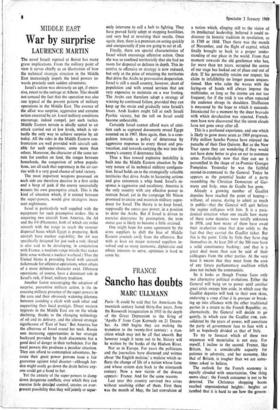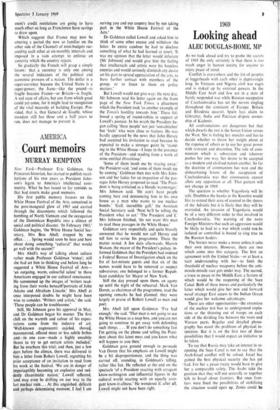Sancho has doubts
FRANCE MARC ULL3IANN
Paris—It could be said that for Americans the twentieth century lasted thirty-five years, from the Roosevelt inauguration in 1933 in the depth of the Great Depression to the firing of 'Apollo 8' from Cape Kennedy on 21 Decem- ber. As 1969 begins they are making the transition to the twenty-first century: a tran- sition which may not be all that smooth. But however rough it turns out to be, history will be written by the banks of the Hudson River.
Not so in Europe. For years the politicians and the journalists have discussed and written about 'the English malaise,' a malaise which re- flects the change of life of a nation whose fame and whose system date back to the nineteenth century. Now a new victim of the disease appears : France. And for the same reasons.
Last year this country survived two crises without resolving either of them. First there was the month of May, the last convulsion of a nation which, clinging still to the vision of its intellectual leadership, believed it could re- discover its historic tradition in revolution, as in 1789 or 1848. Then there was the month of November, and the flight of capital, which finally brought us back to a proper under- standing of our place in the world. From that moment onwards the old gentleman who has, for more than ten years, occupied the centre of our stage has looked out of place and out of date. If his personality retains our respect, his claim to infallibility no longer passes unques- tioned. Men who calm the waves with the - laying-on of hands will always impress the multitudes, so long as the storms are not too frequent; for if the trick is too often repeated• the audience shrugs its shoulders. Disillusion is measured by the hope to which it succeeds. Intoxicated for a moment by the sheer bravado with which devaluation was rejected, French- men have now discovered that the storm clouds have not gone away after all.
This is a profound experience, and one which is likely to grow more acute as 1969 progresses. Fifty million Sancho Panzas have enjoyed the panache of their Don Quixote. But as the New Year opens they are wondering if they would not have done better to give an ear to common sense. Particularly now that they can see it personified in the shape of ex-Premier Georges Pompidou. Yesterday he was the faithful second-in-command to the General. Today he appears as the potential leader of a party resembling the Christian Democrats of Ger- many and Italy, once de Gaulle has gone.
Already a growing number of Gaullist deputies have reached the point of hoping— without, of course, daring to admit as much in public—that the General will quit before the regime collapses with him. It is a para- doxical situation when one recalls how many of these same deputies were totally unknown in 1958, and how many of them have owed their re-election since that date solely to the fact that they carried the Gaullist ticket. But this is the point. Little by little they have dug themselves in. At least 200 of the 300 now have a solid constituency backing : and that is 'a great deal more than can be said of their colleagues from the other parties. At the very least it means that they must form the core of any future parliamentary coalition which does not include the communists.
So it looks as though France faces only two alternative political evolutions. Either the General will hang on to power until another great crisis sweeps him aside, in which case the Gaullist deputies will look to their own skins, endorsing a coup creiat a la grecque or break- ing up into alliances with the other traditional parties in a return to the French Republic; or, alternatively, the General will decide to go quietly, in which case the Gaullist UNR, con- solidated by the years of power, will constitute the party of. government face to face with a left as hopelessly divided as that of Italy.
To try to forecast which of these two sequences will materialise is not easy. For myself, I incline to the second. France, like Britain, has a considerable capacity for patience in adversity, and her economy, like that of Britain, is tougher than we •are some- times asked to believe.
The outlook for the French economy is equally clouded with uncertainties. One thing seems clear : the French consumer is not to be deterred. The Christmas shopping boom reached unprecedented heights : heights so rarefied that it is hard to see how the govern-
ment's credit restrictions are going to have much effect so long as Frenchmen have savings to draw upon.
Which suggests that France may now be entering a period (by now so familiar on the other side of the Channel) of mini-budgets suc- ceeding each other at six-monthly intervals and imposed in a vain attempt to enforce an austerity which the country rejects.
So gradually the French, will grasp a simple lesson: that_ a currency is only one among the several indicators of the political and economic prowess of a nation. The dollar is a super-currency because the United States is a super-power; the franc—like the pound—is fragile because France—or Britain—is fragile. A sad state of affairs, but one from which good could yet come, for it might lead to recognition of the vital necessity of building Europe. Pro- vided, that is, that General de Gaulle, whbse mandate still has three and a half years to run, does not manage to prevent it.



































 Previous page
Previous page